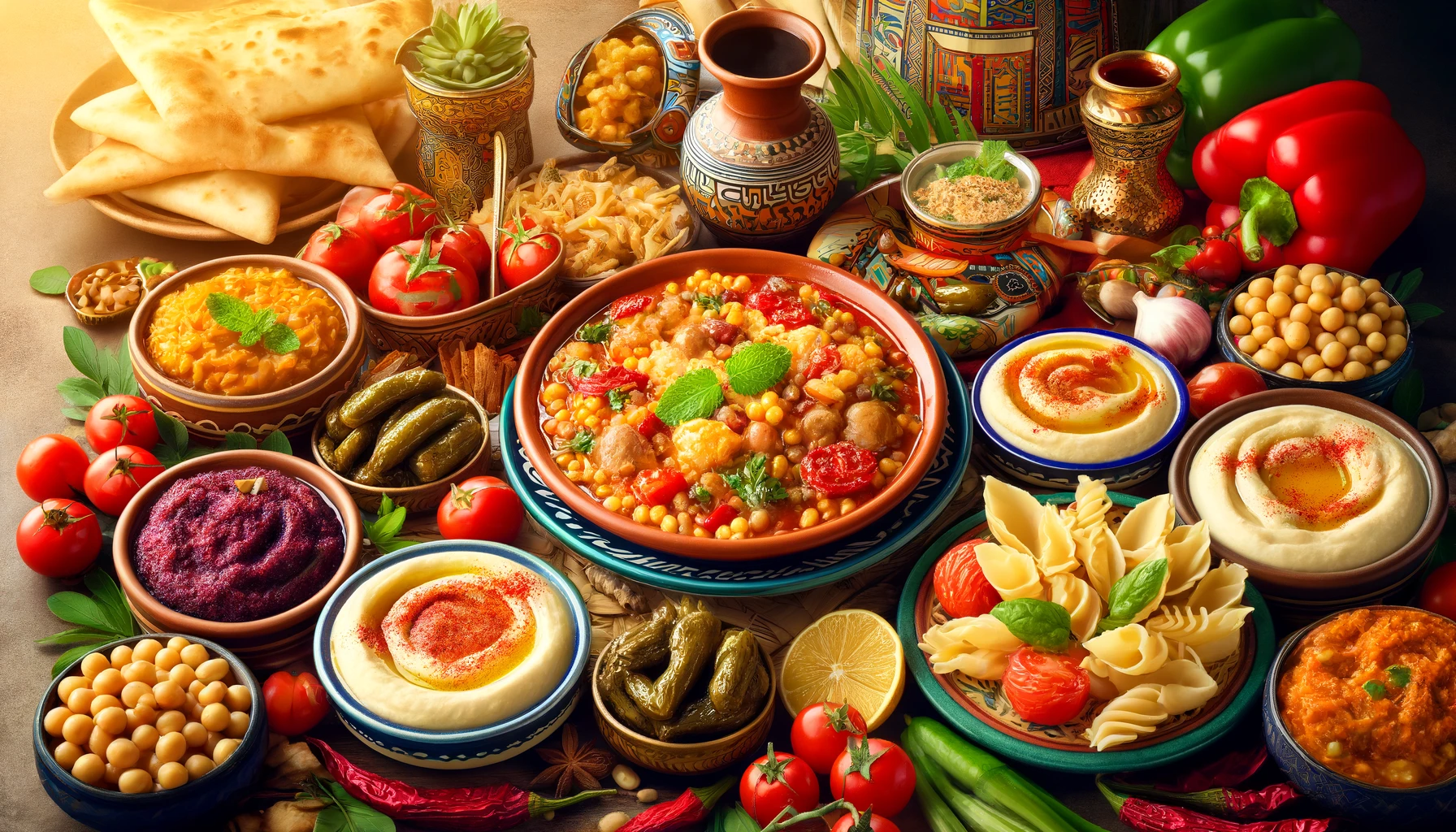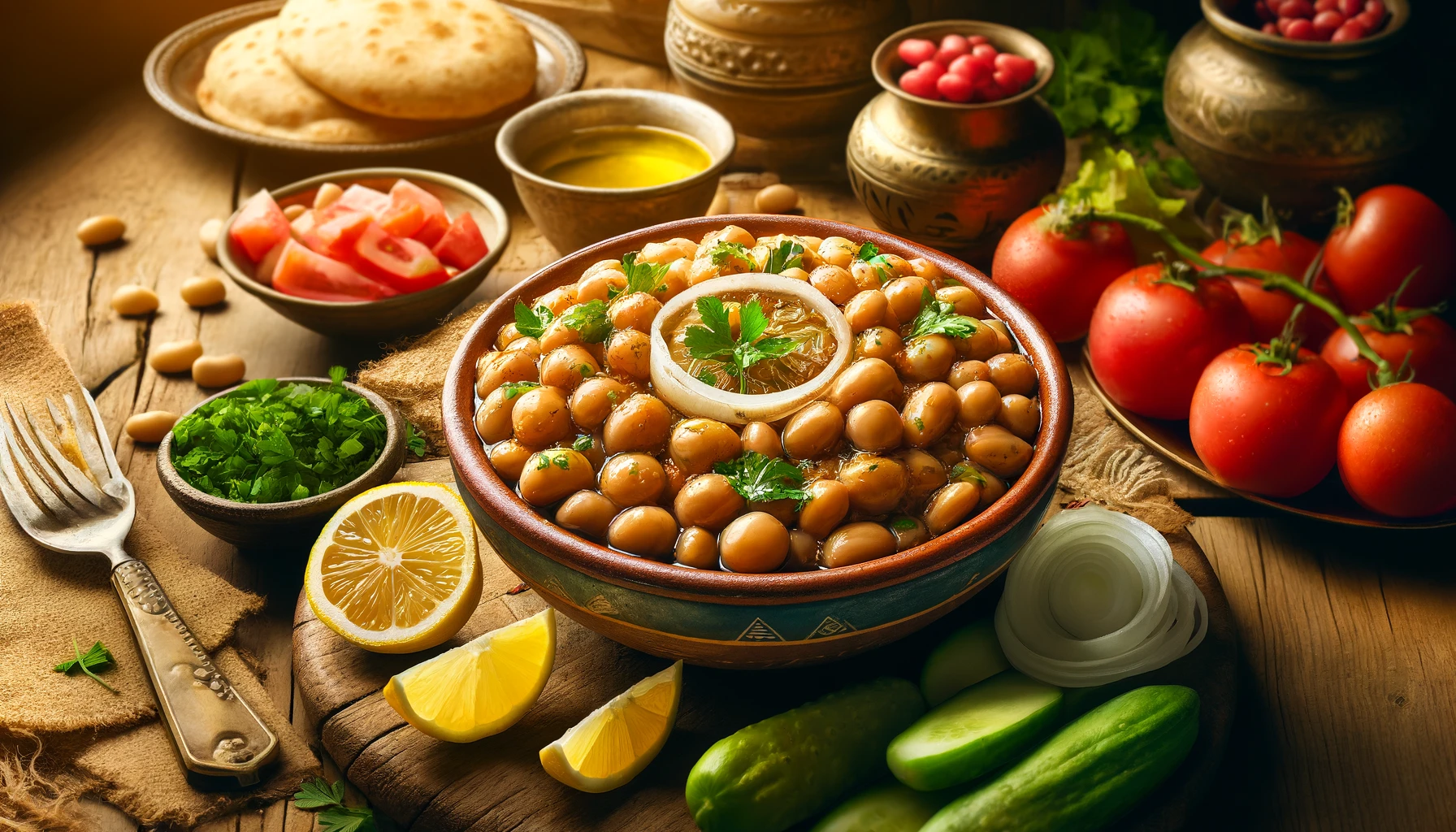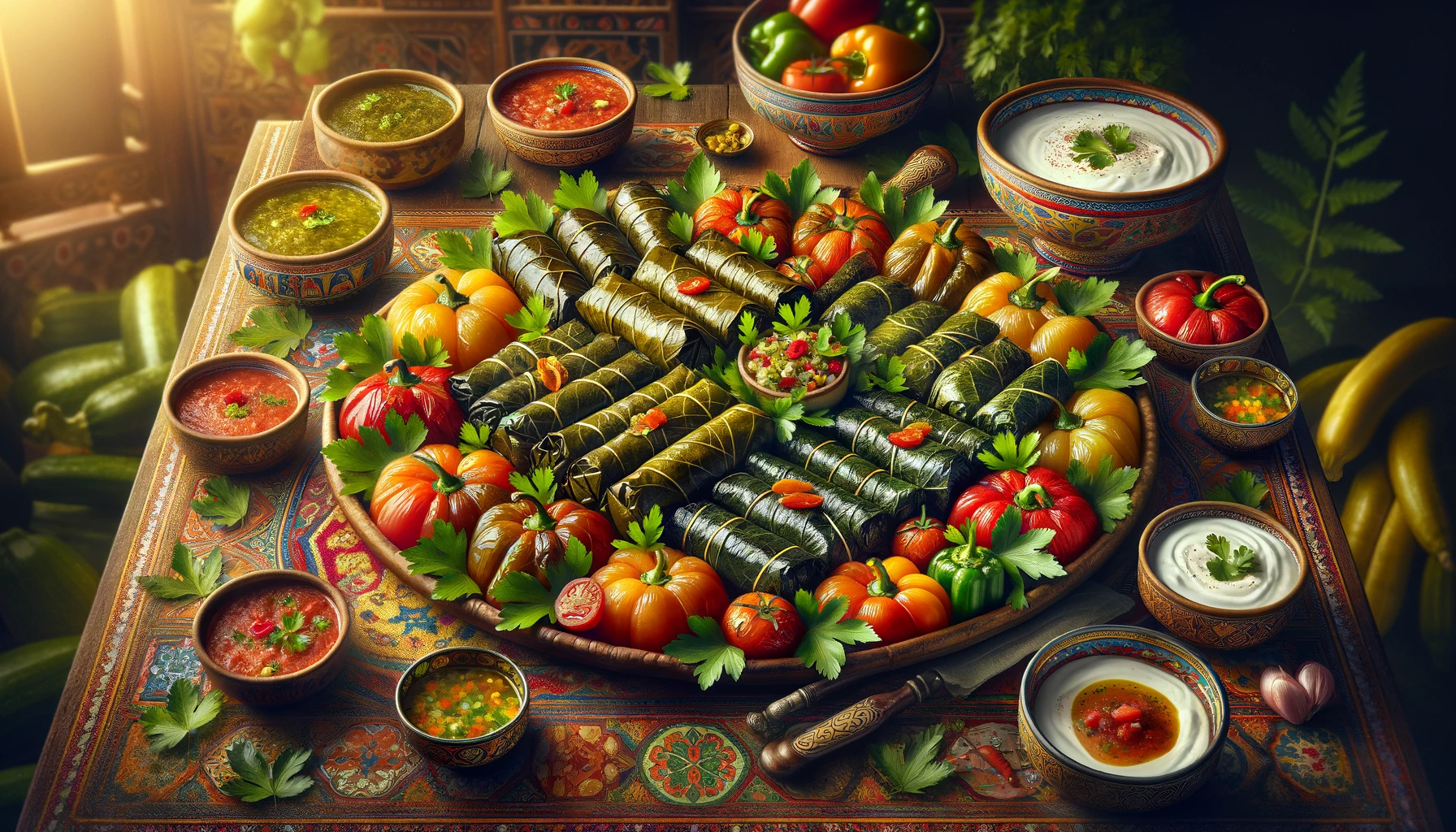Introduction
Egyptian Food : If you imagine Egypt What images come to your mind? The pyramids or the Sphinx or the Nile? Although they are all iconic, Egyptian food is a treasure that is waiting to be discovered. Roots that go back to the ancient world, the flavours and customs that are part of Egyptian food have been through the ages providing a delicious trip through the history of food through a plate.
Table of Contents
The Essence of Egyptian Cuisine
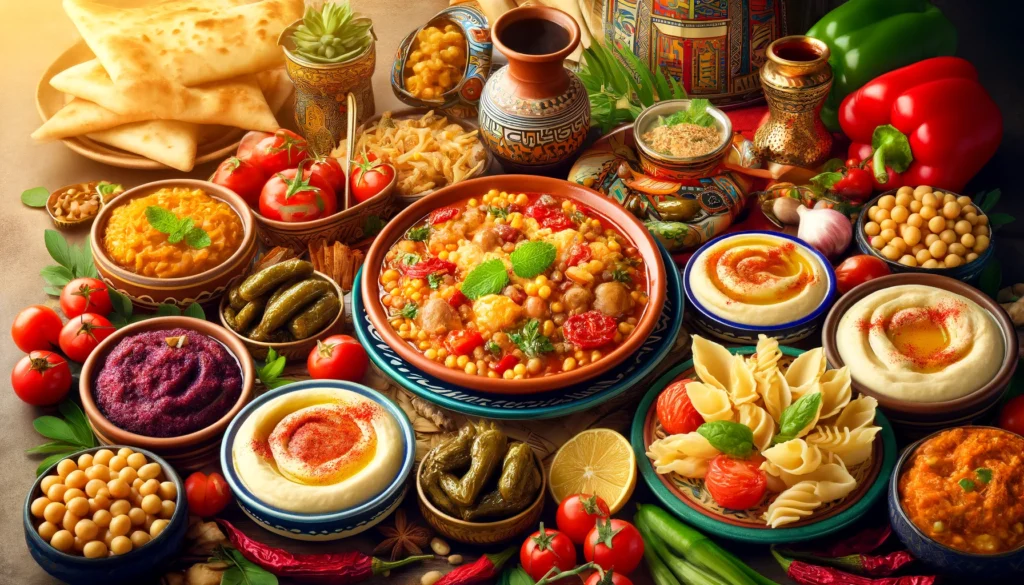
Key Ingredients
Egyptian food is a mix of textures and flavors that is heavily based on vegetables, legumes, and grains. Food staples such as chickpeas, lentils Fava beans, chickpeas, and rice are everywhere. Bread, especially the flatbread referred to as ‘Aish Baladi is a key ingredient in the diet. Fresh herbs like coriander, parsley, and dill, as well as spices such as coriander seeds, cumin and cinnamon, enrich dishes with a plethora of flavors.
Traditional Cooking Methods
Traditional Egyptian cooking techniques are handed down from generation to generation. Techniques for slow-cooking, such as simmering meats and legumes in rich broths, are well-known. Baking, grilling and frying are well-known, offering a variety of tastes and textures that appeal to the different tastes of people.
Popular Egyptian Dishes
Ful Medames
Ful Medames, a hearty stew made of fava beans, is an iconic Egyptian dish. It is cooked using garlic, olive oil lemon juice, various spices, it’s usually eaten in the morning with toast and warm bread.
Koshari
Koshari the national dish of Egypt is a sweet treat for those who love carbs. The comforting blend of lentils, rice, and macaroni that is topped with fiery tomato sauce, chickpeas and crisp onions is a popular street food staple.
Mahshi
Mahshi, also known as stuffed vegetable is a great example of the inventiveness of Egyptian food. Fruits such as bell peppers, zucchini as well as grape leaves, are packed with a delicious mix of herbs, rice, and occasionally minced meat, later simmered in a rich tomato sauce.
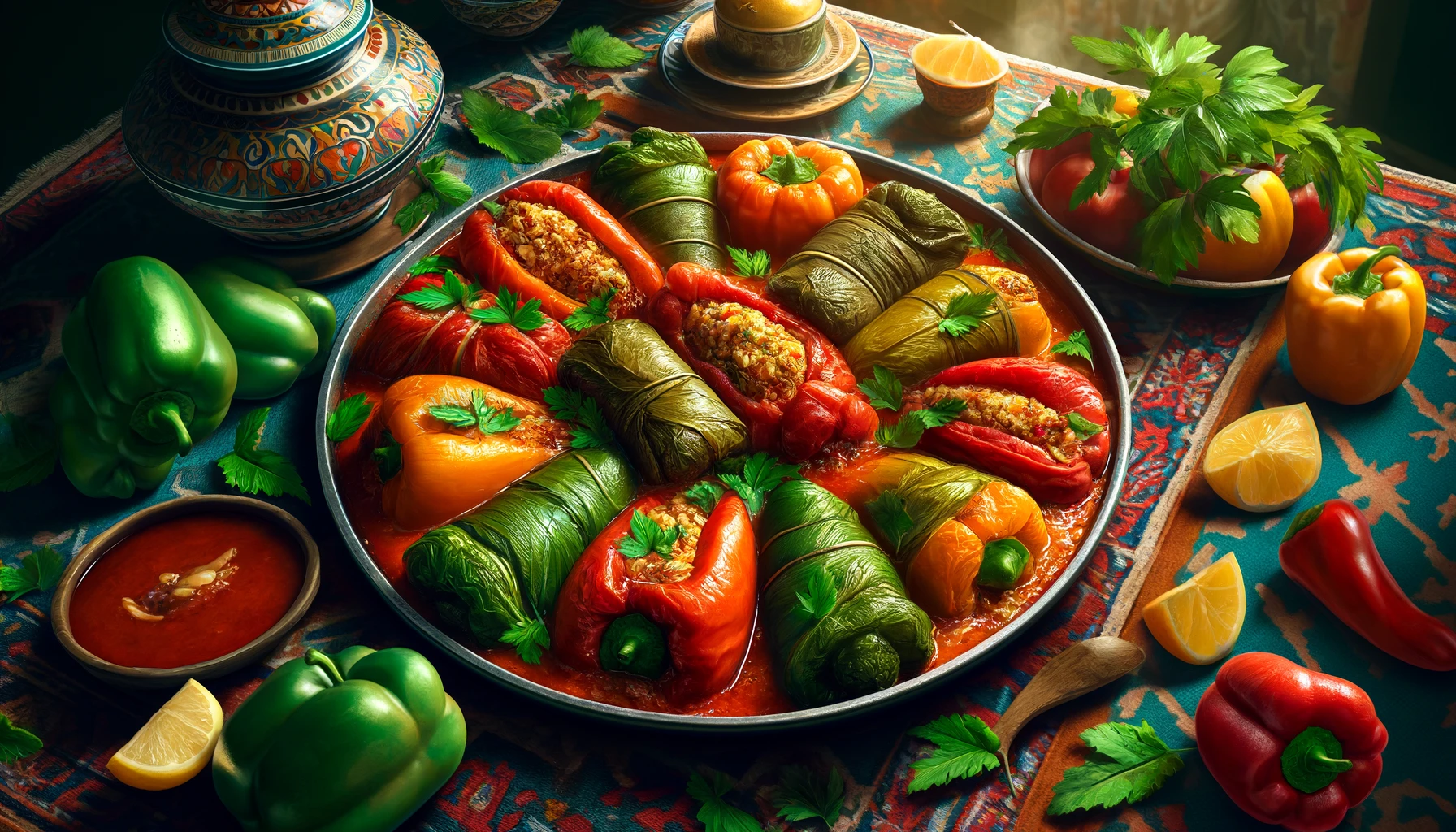
Bread: A Staple in Egyptian Diet

Types of Egyptian Bread
Bread is not simply a condiment in Egyptian cuisine. It’s a standard. “Aish Baladi” is a flatbread made of whole wheat that is served with virtually every meal. The ‘Aish Shamsi’, the traditional sun bread and ‘Aish Merahrah’, which is a fenugreek flavored bread are also well-loved.
The Role of Bread in Daily Meals
Bread can be used to scoop food up and soak up sauces and also as a vessel to wrap food items. Its importance in Egyptian meals is unquestionable and is the foundation of the daily diet.
Vegetarian and Vegan Options

Popular Plant-Based Dishes
Egyptian food is primarily vegetarian, with a wide range of vegan and vegetarian dishes. “Tamiya,” which is the Egyptian version of falafel that is made with fava beans, as well as Bessara, a rich dip made with herbs and fava beans, are must-try dishes.
Nutritional Benefits
The plant-based foods are not just delicious, but are also loaded with nutrients. They are high in fiber, protein and vital vitamins They contribute to a healthy and balanced diet.
Meat and Seafood Delicacies

Common Meat Dishes
Plant-based meals are widely used, Egyptian cuisine also boasts exquisite meat dishes. “Kofta,” meatballs seasoned with spices and ‘Shawarma barbecued meat marinated on a spit are adored across the nation.
Seafood Specialties
Egypt’s proximity to Mediterranean as well as its proximity to the Mediterranean and Red Sea brings a bounty of seafood dishes to your table. Dishes such as ‘Sayadeya’ an enticing spiced rice and fish dish and ‘Samak Mashwi which is grilled fish, show the flavors of the coast in Egypt.
Egyptian Spices and Flavors
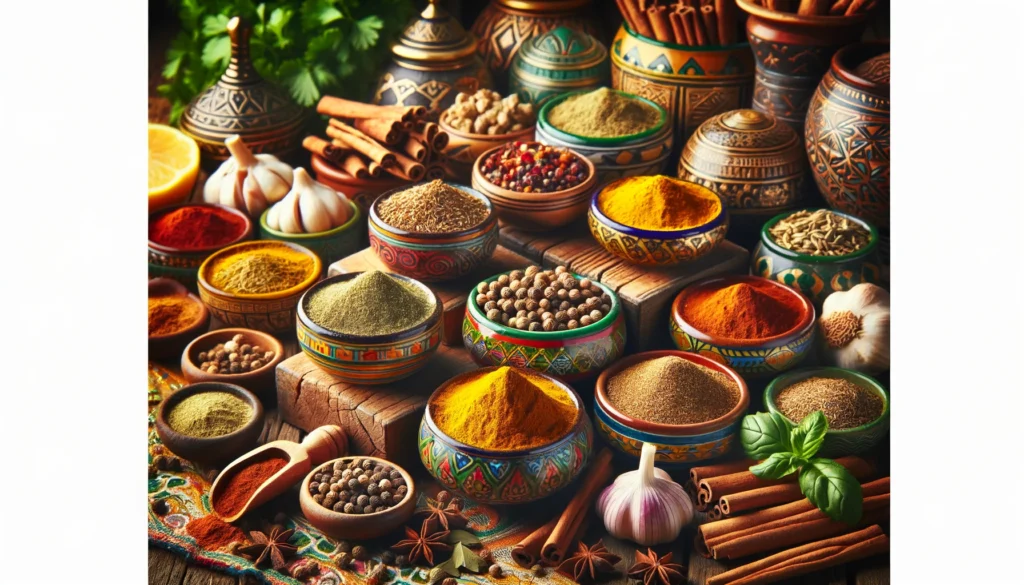
Essential Spices
Spices are at the core of Egyptian food. Cumin, coriander as well as caraway seeds, are often utilized, and cloves and cinnamon add warmth to sweet and savory food items.
Unique Flavor Profiles
The combination with fresh spices and herbs gives distinctive flavour profiles that are familiar and exotic. The perfect balance of tangy spiced, and delicious ingredients is a signature in Egyptian cooking.
Street Food Culture in Egypt

Popular Street Foods
Street food is an integral aspect of Egyptian culture. “Hawawshi,” a spicy meat-filled breads, and “Sambousek,” savory sweets are a favorite for both tourists and locals alike.
Street Food Markets
The bustling markets in Cairo, such as Khan el-Khalili, offer a sensory feast of smells, sights, and flavors. Street vendors sell freshly prepared dishes that offer the authentic flavor of Egypt.
Festive and Special Occasion Foods

Traditional Celebratory Dishes
Egyptian festivities are marked with special meals. “Fatta,” a multi-layered dish consisting of bread, rice and meat, as well as “Ringa,” which is smoke-smoked herring are usually served during celebrations and holidays.
Holiday Specialties
When it comes to Ramadan the streets are awash with the smell of Konafa, an ice cream made from crumbled phyllo dough, sweet cheese, as well as “Atayef,” pancakes stuffed with fillings, which signal the end in the fast.
Egyptian Desserts and Sweets

Famous Desserts
Egyptian sweets are a treat for those who love sweets. “Basbousa,” Semolina cakes with syrup soaked, and “Umm Ali,” a bread pudding laced with raisins and nuts, are both classics.
Ingredients Used in Sweets
The most common ingredients used in Egyptian desserts are honey, dates as well as coconut, nuts, and honey which create rich and delicious flavor that is usually reserved for celebrations.
Beverages in Egyptian Cuisine
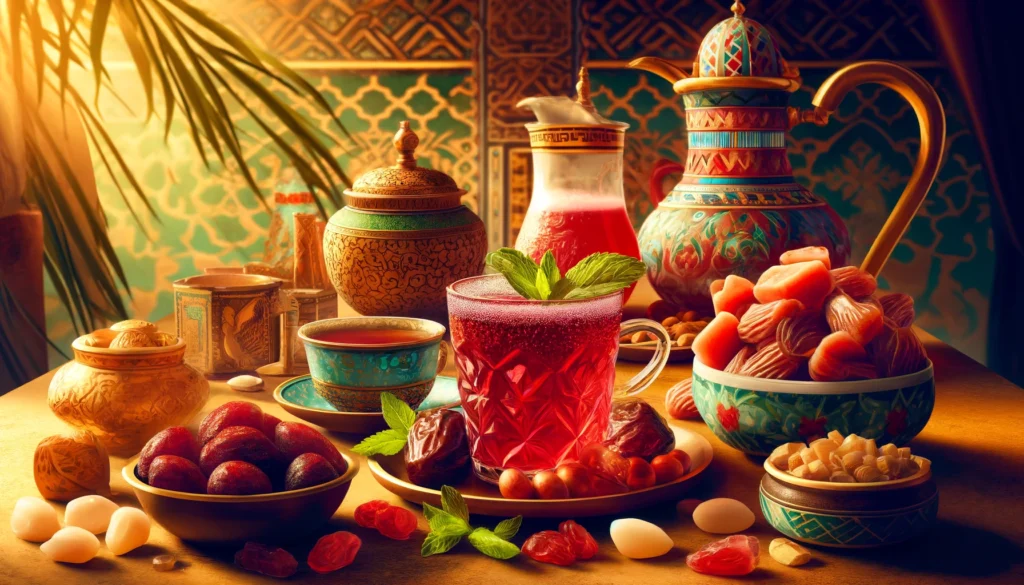
Popular Drinks
Egyptians have a wide selection of drinks, ranging such as ‘Karkade’ which is the hibiscus-infused tea, to Tamr Hindi, which is which is a drink made from tamarind. The refreshing beverages are great to quench thirst during the scorching heat of.
Traditional Teas and Coffees
Coffee and tea have a major role to play in social interactions. Shaayi, a robust black tea, as well as ‘Ahwa’, a classic coffee, are the staples of Egyptian homes and cafes.
Regional Variations in Egyptian Cuisine

Differences Between Upper and Lower Egypt
The Egyptian cuisine differs from south to north. Upper Egypt, with its Nubian influences, is known for its richer and more spicy tastes, whereas lower Egypt’s food is more mild and heavily in the influence of Mediterranean flavors.
Regional Specialties
Each region boasts unique specialties. In Alexandria seafood reigns supreme and in Aswan food items such as ‘Feseekh’, a fermented fish are typical dishes.
Health Benefits of Egyptian Food
Nutritional Value
Egyptian cuisine is an energizing diet that is that is rich in legumes, vegetables and lean proteins. These nutritious foods promote overall well-being and overall health.
Healthy Eating Habits
Traditions of the Egyptian diet is based on balanced and moderate eating and focuses on whole, fresh food items, which makes it a healthier option for those who want to keep a balanced diet.
Cooking Egyptian Food at Home
Simple Recipes for Beginners
Cooking Egyptian cuisine at your home can be a satisfying experience. Start with recipes that are simple like “Shorbet Adas,” an oxtail soup or the ‘Roz Laban,’ a rice pudding, for an experience of Egyptian food.
Cooking Tips and Tricks
In order to master Egyptian cooking, make use of fresh ingredients, cook slowly by slow-cooking techniques and don’t be scared to try new spices. These tips will assist you to cook tasty and authentic Egyptian food items.
Conclusion
Egyptian cuisine is a complex blend of culture, history and taste. From rich stews to delicate cakes, each one is a tale of an ancient civilization that has influenced our modern tastes. So, the next time you’re trying to discover new culinary possibilities, take a dive into the realm of Egyptian cuisine and taste the tastes of this ancient civilization.
FAQs
Are there must-do Egyptian food items?
- Ful Medames, Koshari, Mahshi and Tamiya are some of the must-try meals that provide a real flavor of Egyptian food.
Are Egyptian Food spicy?
- Although some dishes are slightly spicy, Egyptian cuisine is not generally extremely spicy. It is more focused on fragrant spices and herbs to enhance the flavor.
Are there vegetarian alternatives in Egyptian food?
- Indeed, Egyptian cuisine is rich in vegetarian options, with a number of recipes like Koshari, Tamiya, and Bessara all based on plants.
What has the the modern Egyptian food changed?
- Modern Egyptian cuisine has taken on the influences of other cultures while maintaining traditional flavours. There’s an increasing trend of fusion meals which blend Egyptian ingredients with cooking techniques from around the world.
What are some of the unique ingredients found in Egyptian cuisine?
- The unique ingredients are Molokhia (jute leaves) dried limes and fenugreek seed, which can be used to create unique flavor profiles in Egyptian food items.
